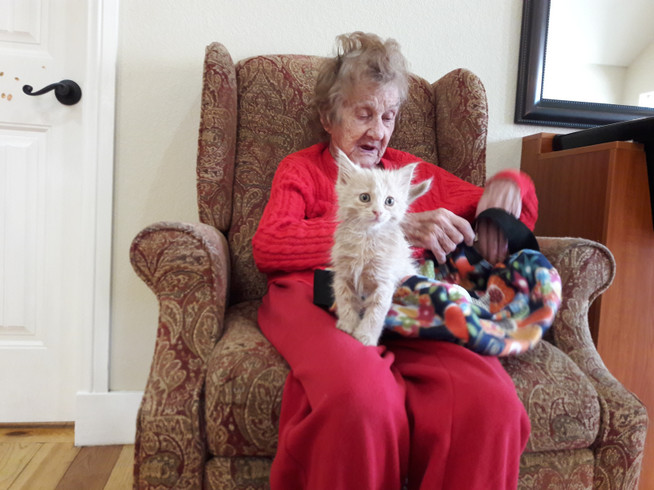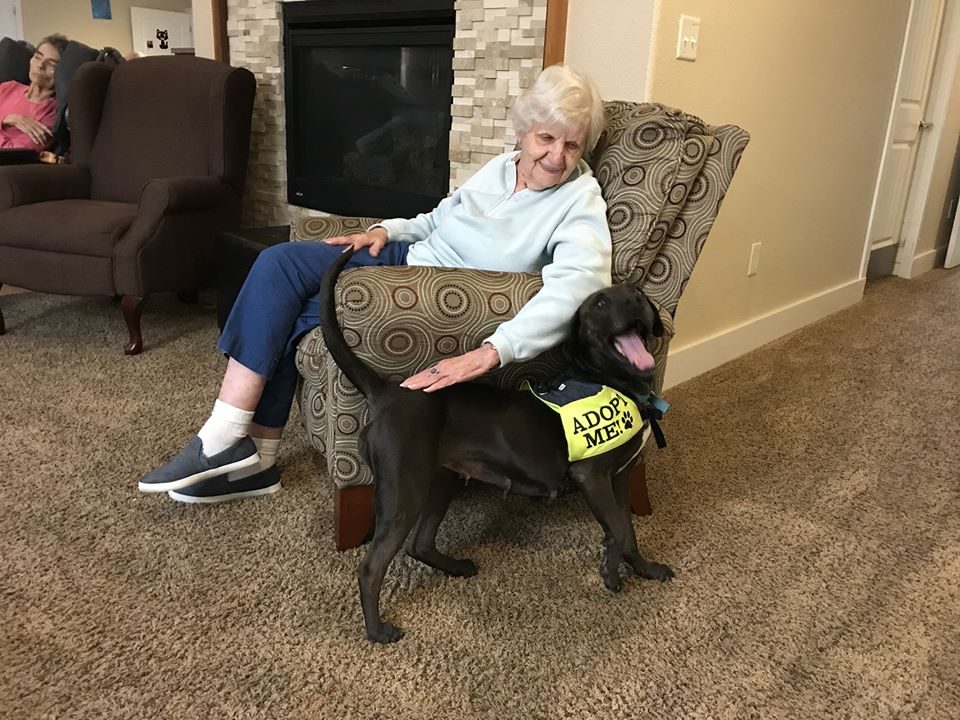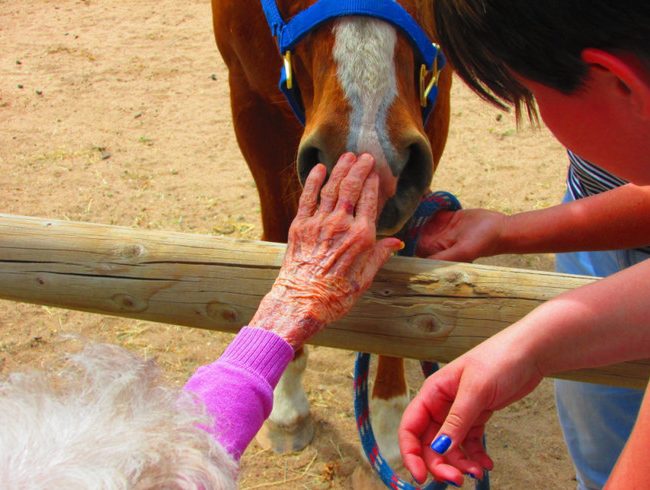Pet therapy is a term used to describe the use of animal companionship for improving human health and well-being. Proponents of animal-assisted therapy believe that interactions with pets can have positive effects on people with a wide range of physical, emotional, mental, and spiritual health conditions. Caregivers widely use pet therapy in assisted living care, nursing homes and hospitals.
Many health professionals suggest pet therapy as an effective treatment for people who have dementia. Studies have shown that people who spend time with animals have lower stress levels and feel less lonely than those who don’t have a pet. In addition, pets benefit from the activity because it gives them a sense of purpose.

Why Do People with Dementia Love Pets?
One downside to caring for seniors with dementia is trying to bring a bit of enjoyment back into their lives. Often, your loved ones will have very limited abilities to do the things they used to enjoy. The disease has taken away many of their abilities and pleasures that they once had, but pets can be a great way to bring some of those joys back.
Pets also require little care—at least not compared to a child or other human being with special needs. They usually sleep through the night so you don’t have to worry about getting up to take care of them in the middle of the night and they never complain. They are happy eating whatever food you normally feed them.

How Pet Therapy is Beneficial for Seniors with Dementia
Pet therapy, or animal-assisted therapy (AAT) is therapy that uses animals in the treatment of human illnesses, disabilities, and psychological disorders. These animals include dogs, cats, rabbits and guinea pigs, among others. We can use AAT along with other therapies or by itself. It has many benefits for the elderly, children with autism and the disabled.
The goal of animal-assisted therapy is to improve human health. This happens through interaction with a pet in an environment where the animal is free to exhibit normal behavior. Pet therapy for seniors with dementia is a great way to improve the quality of life for the elderly.
The human-animal bond has been beneficial in treating seniors who have dementia. There are many psychological, physical and emotional benefits of animal-assisted therapy. Pet therapy is beneficial in treating depression, anxiety, and grief, which are commonly experienced by seniors with dementia.
Animals also help stimulate the senses and provide comfort by physical touch that helps reduce stress. The positive effects of animal-assisted therapy on seniors with dementia are undeniable, as studies have shown it helps improve mood, memory and communication skills. Animal-assisted therapy also increases social interaction among individuals and improves overall quality of life for those with dementia.
Pet therapy is a great way to improve your senior loved one’s quality of life. The companionship and unconditional love that pets offer is often just what seniors with dementia need to stay happy, healthy and active throughout the day.

Treating Alzheimer’s Disease with Pet Therapy
The American Veterinary Medical Association has recognized pet therapy as an effective way to reduce depression in the elderly, add years to the lives of those with terminal illness, and aid in recovery from heart attacks, strokes and surgery.
Pet therapy programs benefit seniors by allowing them an opportunity to interact with animals, experience some joy, and have fun again. Seniors who take part in pet therapy may have a better appetite, sleep better at night and experience fewer episodes of depression.
Pet therapy also has the potential to reduce physical pain for seniors with chronic health conditions, such as arthritis or osteoporosis. Pets can provide physical support when climbing stairs or walking long distances. Their weight can also provide back support for a senior sitting in a wheelchair for long periods of time or for someone who has difficulty standing for long periods of time due to pain.

How Does Someone Choose an Animal for Pet Therapy?
Pet therapy is a wonderful alternative to prescription drugs, whether it’s for the elderly or special needs children. If you are dealing with a loved one who has dementia or Alzheimer’s disease, you should consider pet therapy.
Some believe that animals can sense when something is wrong in someone’s life and will try to comfort them in any way they can. They will lay with you when you’re sad, play with you when you’re happy and act silly when you need to laugh.
Others believe that animals have healing powers, especially dogs. Caregivers have used the service of dogs for years and you can see them in assisted living homes and in hospitals helping seniors with depression or Alzheimer’s disease. Their love for people is natural and unconditional, which makes them perfect candidates for pet therapy work.
Choosing the right type of pet for your loved one with dementia can make all the difference in how they respond to the animal. You want an animal that is calm, not too hyper, and that doesn’t mind a lot of commotion.
For pet therapy, any animal can help, but some are better than others. Some of the best animals for pet therapy are dogs and cats, because they’re extremely adaptable pets with a wide variety of temperaments. They’re also social animals who enjoy being with people.

What Can We Learn from the Use of Pets in Therapy Settings?
Many researchers and caregivers have found that using animals in a therapy setting can help enhance the life of residents with dementia. Those with dementia have an easier time interacting with animals than humans, and time increases happiness for those with the illness. These results can help improve the lives of patients with dementia and allow them to live longer and more comfortably by providing contentment.
You may not think of bringing your pet to a place like an assisted living home, but it is a wonderful idea that has shown significant benefits for seniors and their furry friends. The chance to interact with animals can be life-altering, especially if you are facing the possibility of memory loss.
Applewood Our House is Pet Friendly. On a case-by-case basis, residents can enjoy the love and companionship of a pet while they are still able to love the pet. This brings comfort and delight to residents and their families.






